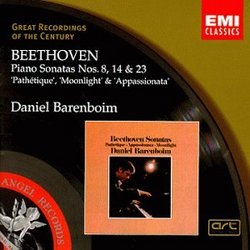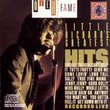| All Artists: Daniel Barenboim Title: Great Recordings Of The Century - Beethoven: Piano Sonatas nos. 8, 14 & 23 / Barenboim Members Wishing: 0 Total Copies: 0 Label: EMI Classics Original Release Date: 1/1/1960 Re-Release Date: 9/14/1999 Album Type: Original recording remastered Genre: Classical Styles: Chamber Music, Forms & Genres, Sonatas, Historical Periods, Classical (c.1770-1830), Romantic (c.1820-1910) Number of Discs: 1 SwapaCD Credits: 1 UPCs: 724356699120, 724356699151 |
Search - Daniel Barenboim :: Great Recordings Of The Century - Beethoven: Piano Sonatas nos. 8, 14 & 23 / Barenboim
 | Daniel Barenboim Great Recordings Of The Century - Beethoven: Piano Sonatas nos. 8, 14 & 23 / Barenboim Genre: Classical
Daniel Barenboim was in his mid-to-late 20s when he recorded all 32 Beethoven sonatas for EMI. His expansive tempos and rhetorical attitude, however, suggest the musings of a weathered veteran of the German school. At thi... more » |
Larger Image |
CD DetailsSynopsis
Amazon.com Daniel Barenboim was in his mid-to-late 20s when he recorded all 32 Beethoven sonatas for EMI. His expansive tempos and rhetorical attitude, however, suggest the musings of a weathered veteran of the German school. At this stage in his career, there was no question that Barenboim¹s instinct for Beethoven's confrontational style was genuine and deeply felt. Yet, there's a self-conscious aura surrounding the pianist's accentuations, breath pauses, and tempo fluctuations. These expressive devices seem grafted onto the music, rather than emerging as organic components of a more internalized vision. True, Barenboim's torrential dash through the Moonlight Sonata's hard-to-control finale and the Appassionata's fiery opening pack a cathartic wallop. But Claudio Arrau's similarly conceived yet more technically polished and musically seasoned versions surpass Barenboim's aspirations to be the Furtwängler of the piano. Incidentally, Barenboim eschews Beethoven's crucial third-movement repeat in the Appassionata. For headlong brio and terse concentration, Rudolf Serkin's 1963 traversals of these oft-recorded "name" sonatas for CBS deserve a sonic facelift on the order of EMI's beautiful, lifelike remastering here. --Jed Distler Similarly Requested CDs
|
CD ReviewsMixed bag - more good than bad charles morgan, music fanatic | 08/15/2004 (4 out of 5 stars) "I was kind of surprised that the other reviewers here were in such ferocious debate over the CD, since I bought it before reading reviews, and liked it...but a few more listens have proven some of the criticisms (though not all). Pathetique: A very good rendition. Some people take exception with the slow intro, but I rather like it. The disc's booklet says Barenboim considers the sonata "the birth of the Romantic era" and doesn't "politely evade" the slow intro - definitely true. I think it gives the piece a darker cast, a bit of real color - and makes the following first movement seem even more furious. The slow movement's taken a bit fast, but then I have been told that I advocate VERY slow tempi for both this and the Fur Elise...so probably it isn't a bit fast really. Only real complaint - a few wrong notes in the outer movements, but nothing to skip the CD over. Moonlight: When I agree with my mom, you KNOW it's done right. And we both agree that the first movement is done beautifully, heartbreakingly. I don't like the scherzo, no matter how it's played, so I can't tell you if it is played well. The finale is played very well, and here Barenboim shows his technical skill. (EDIT: Okay, maybe not. He's outdone by budget-disc phenom Jeno Jando, who plays it 30 seconds faster and nails every. single. note. WOW - knockout performance for Mr. Jando...but the Barenboim is still okay.) Appassionata: First two movements done well, and I like the tempo on the slow movement (it's actually, well, slow), but the whole skipping-part-of-the-finale thing is not good, not excusable, and only barely forgiveable. (I also reviewed a version of Mozart's 41st where the finale is sliced up - I hate that kind of "edit". grr) So there are some flaws, including wrong notes in the first track and rather dull moments elsewhere (plus the big omission), but the rest of it is just fine and Dan Barenboim does NOT deserve the fiercely angry comments of some reviewers on this page. Consider buying this CD if you are really fanatical about the sonatas here, but if you want just one version of them, look elsewhere first. One final comment: the producer is one Suvi Raj Grubb, a bald Indian guy who just so happened to produce several Itzhak Perlman recordings. This guy must have had an eye for talented young musicians!" Disappointing Set mdsfnelson | Severn, MD USA | 04/30/2002 (3 out of 5 stars) "I was truly distraught when I brought this disc home and listened to the opening bars of the "Pathetique": the tempo was so slow it actually belied the concept of "tempo." So slow the music seemed to pull apart at the seams. I'm usually all for a more extreme reading of tempo markings, particularly with Beethoven, but there has to be some restraint, and I think Barenboim missed the mark here. Too bad, because the playing is otherwise excellent, and he hits the nail on the head, it seems to me, with the more energetic allegros. Unfortunately, I cannot recommend a disc of sonatas wherein each of the slow movements serves as an annoying distraction to the superior performances of the fast movements. Try Brendel (3rd cycle), Kempff, or Schnabel for a more even reading of some of the most wonderful music ever composed." Uninteresting throughout hjonkers | The Netherlands | 03/28/2004 (2 out of 5 stars) "Barenboim's playing of these three famous sonatas perfectly summarizes his playing of the other twenty-nine: unfelt, not musical, forgetting dynamic accents and staccato marks, too loud in the forte and too soft in the piano sections. I don't hear any spontaneity here, nor freshness, drama or even passion. These are party recordings at their best. The slow movements of all three sonatas are uniformly flat that it's hard to keep your attention with them. The fast movements suffer either from thorough dullness (he plays all the notes of the first movements of both Pathetique and Appassionata but that's about it) or, even worse, dullness in combination with banging (the final movements of all three sonatas). I've never heard the main theme in the last movement of the Appassionata sound this boring. Nor have I heard anyone play the movement's last minute this ugly. And he omits the repeat! The Mondschein's final: same story. There are SO many better recordings of these three sonatas that it's rather ashaming to see EMI put Barenboim's recordings in the 'great recordings of the century' series. EMI is that company that has a load of great Beethoven recordings by Edwin Fischer lying in its store vaults, but seemlingly prefers to release mediocre, dull readings like these. Anyway, if you want to hear these pieces in better renditions, you'd best go for Arrau's disc with these three sonatas on Philips (which is cheaper too), Brendel's two-fer with the 'favourite' sonatas or Gilels' recordings on DG. For an entire sonatas set, Kovacevich is also recommended. Barenboim's readings of Beethoven are thoroughly uninteresting and don't deserve any attention in such a crowded catalogue."
|

 Track Listings (9) - Disc #1
Track Listings (9) - Disc #1



